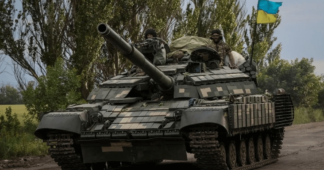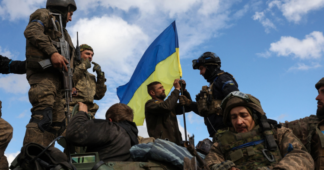By Maxim Goldarb
The Ukrainian people are doing the kind of dirty work
that we would never want
to do here in the United States.”
– Mark Esper, former U.S. Secretary of Defense
The main recent event for both tens of millions of Ukrainian citizens in Ukraine and millions of Ukrainian refugees in other countries is the adoption of a new law on mobilization.
Any competent lawyer will tell you that in law school he or she was always taught to look into the depth of the law, to understand the logic of the legislator, his or her goals in creating the law. Officially declared by the authorities as the goals of this law “to put in order the registration of Ukrainians liable for military service, to level the gaps in the legislation on military registration, to deal with the available human resources, etc.” look at least secondary. The main goal, which clearly shines through the verbal legislative wisdom, political aplomb, and quasi-patriotic slogans, seems to be the authorities’ inexorable desire to maximize the fulfillment of the formula of exchanging money and weapons for lives.
It is hardly a coincidence that almost immediately after Zelensky signed this law, the U.S. authorities very quickly resolved the issue of $61 billion in military funding for Ukraine, which had not been resolved for a year.
But let’s get to the point. The new “mobilization” law, which comes into effect on May 18 of this year, sharply tightens the rules of forced mobilization. The law introduces a stricter registration of persons liable for military service, the obligation of almost every man from 18 to 60 years old, wherever he is and however he feels about the ongoing war in Ukraine, to inform the military authorities about himself, as well as to carry a military ID card with him at all times. In addition, the draft age for mobilization has been lowered from 27 to 25.
Since the law came into force, Ukrainian men have 60 days to update their data in territorial recruitment centers (TRC). If the data is not updated within this period, administrative liability in the form of large fines will be imposed. Think about it: in a country with an average salary of 400 euros, the size of the “mobilization” fine will be between 400 and 600 euros! If the fine is not paid, it opens the way to blocking the accounts of the mobilized persons and further seizure of their property.
These are some of the main innovations of the law. According to the authorities’ plan, they will allow to take out of the “shadow” many persons liable for military duty who do not want to fight, will put these people on the other side of life, will make them outside the law. After all, they will be banned from public service, service in municipal institutions. Moreover, simply because of their lack of military registration documents, such Ukrainians are easy and desirable prey for all kinds of patrols, policemen and informers. According to rough estimates, there may be about a million such people in Ukraine now.
Before the adoption of this law, the detention of people directly on the streets, which happened quite often, was still an illegal action on the part of the authorities. This gave Ukrainians a chance to protect themselves with the help of legal mechanisms. Now such an opportunity to protect themselves from the arbitrariness of the authorities is actually canceled.
At the same time, the authorities are no longer obliged to actually deliver a summons to a person. Now its non-delivery is legalized: the postal service marking it “not delivered” will officially mean that the citizen has received it!
As we have already written, people who fail to fulfill the requirements of the new law can be deprived of the right to drive a car, forcibly detained by the police and taken to the TRC, fined. At the same time, filing an appeal by a citizen against a court decision on his punishment does not suspend the effect of the appealed decision! This is an obvious legal absurdity, the consequence of which will be the shattered fates of people due to often illegal, moreover, not enforceable court decisions: in essence, this law annulled the right of a person to a fair trial and the right to appeal.
Also, without a military ID card, military conscripts will not be issued a passport abroad. This also applies to young men from 18 years of age who left Ukraine before they came of age. That is, in order to be able to receive Ukrainian documents abroad, they must go to Ukraine for a military registration document. But since they will not be released from Ukraine afterwards, it makes no sense. Moreover, the new law stipulates that not only passport services, but also all consular services abroad for all men from 18 to 60 years of age will be provided only upon presentation of a military ID card.
For tens of thousands of Ukrainians who do not have military tickets, it has become impossible to receive consular services without returning to Ukraine.
Even before the adoption of the law, thousands of them applied to consulates and other government agencies abroad to renew their passports in advance, without which legalization in the same EU countries is problematic. This formed huge queues in those countries where there are many refugees from Ukraine: Poland, the Czech Republic, Germany and others. People hoped that if they applied for documents before the law came into force, a passport could be issued without presenting a military ID card.
However, already on April 23, the Ukrainian authorities imposed a ban on the issuance of documents, even before the law came into force: an order of the Ministry of Foreign Affairs of Ukraine “temporarily suspended the performance of consular actions on applications of male Ukrainian citizens aged 18 to 60 years”. This is the clearest litmus test of the meaning of the new law on mobilization: the return and sending to war of thousands of Ukrainians who do not want to participate in it.
More and more Ukrainian men are desperate to flee the country, unwilling to die for someone else’s self-serving purposes.
In 2023 alone, according to the BBC, more than 90 Ukrainians died in the mountains of Romania while trying to illegally cross the Ukrainian-Romanian border and escape the war, 24 died while trying to escape by swimming across the border river Tisa. The number of those who managed to leave Ukraine is estimated in the tens of thousands.
Fulfilling the “precepts” of NATO chief Stoltenberg that the war in Ukraine “should last a few more years”, the Ukrainian authorities have also focused the effect of this law on the younger generation, those who are under 18 years of age: according to the most conservative estimates, there are about half a million 15- to 18-year-olds left in Ukraine today. In addition, several hundred thousand Ukrainian students are also taken into account. Thus, we are talking about the near future of almost a million young Ukrainians, still potentially a “living force”, which, according to the authorities, will be used together with the arms supplied to the country.
The country today is becoming more and more like a huge prison for its own population, trapped inside, deprived of civil rights, where the authorities are trying to drive back those who managed to escape from it by all rights and wrongs.
But as in any prison, there is a commandant’s office, guards and a privileged part of the “prisoners”. A very important point in the law is that it actually openly divides men of conscription age into “two sorts”: those who are protected from mobilization and… those who remain.
Thus, exemption from mobilization is granted to all members of the police, special services and other law enforcement agencies – a minimum of 300 thousand armed adults, mostly engaged in catching fellow citizens, suppressing dissent, performing punitive-police functions.
In addition to them, all heads of public authorities, including deputies, ministers, their deputies and so on, as well as not only employees of strategically important enterprises, but also their owners (in Ukraine, as a rule, these are oligarchs) should not be in line. It is all too obvious who such a norm was written for: the ruling oligarchic regime has exempted from mobilization itself in the person of top officials and oligarchs, as well as its forceful support in the form of police and special services.
An important point: while providing protection from mobilization to judges, investigators and prosecutors, for some reason the legislator did not do the same for lawyers. Why? The answer is simple: the authorities do not need those who should and can protect people from arbitrariness; the authorities need the fear and helplessness of the people.
It is not the rich minority that will be sent into the bloody meat grinder of war, but the poor majority – the unemployed, laborers, peasants, teachers, doctors, office workers…. Now, with the adoption of the new law, the number of men deprived of basic human rights, who will be caught, as in hunting, and sent to the front, will increase many times over.
The profits of those who profit from this war will also increase many times over, as I have already written about many times. This huge money will be shared by the military-industrial complex, its lobbyists in the American and European establishment, and the Ukrainian oligarchic top brass.
Roger Waters, leader of Pink Floyd, on the reasons for the war: «The best thing that has happened to them in the last 10 years is the conflict in Ukraine. They let it happen because of the real business benefit. They make money from wars, among other things: they produce weapons, sell them and make a profit. It is not you and me or ordinary people who invest in the military industry, but only the bigwigs. And in wartime, their proceeds skyrocket.»
Ordinary Ukrainians will get only another round of new deaths and misfortune.
We remind our readers that publication of articles on our site does not mean that we agree with what is written. Our policy is to publish anything which we consider of interest, so as to assist our readers in forming their opinions. Sometimes we even publish articles with which we totally disagree, since we believe it is important for our readers to be informed on as wide a spectrum of views as possible.











